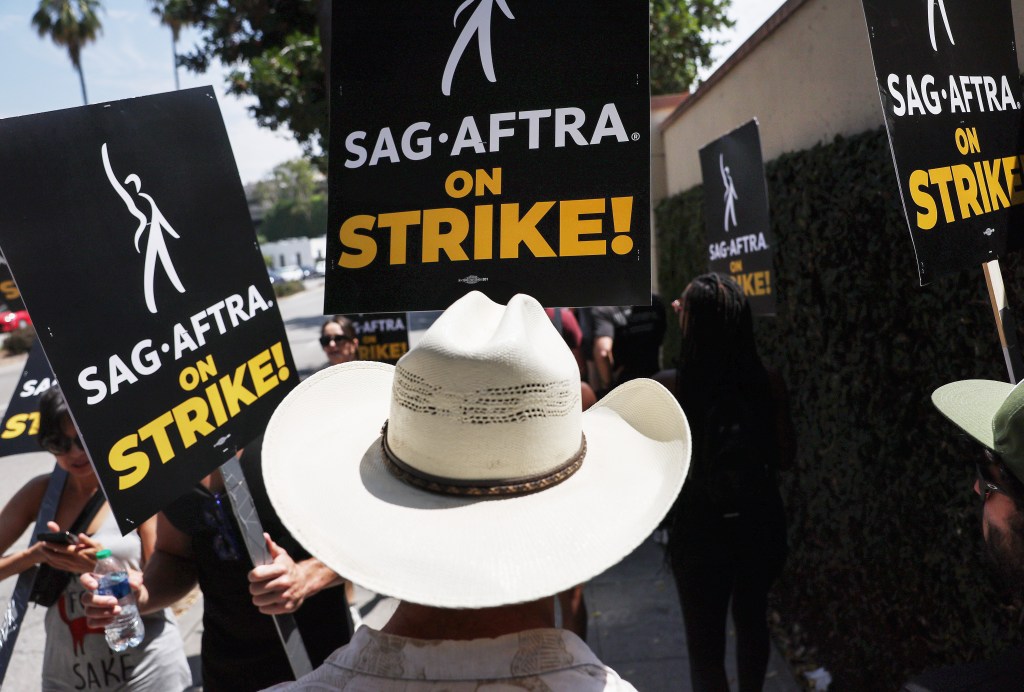SAG-AFTRA’s national board voted unanimously on Friday to ask members to authorize a strike against 10 video game companies, saying that the companies had “failed to address” members’ needs in relation to on-set protections, AI regulations, and proper wages during contract negotiations.
The strike authorization vote began on Tuesday, when postcards with instructions on how to vote were sent to eligible members, and could open the door for a second simultaneous SAG-AFTRA strike, according to a press release.
Videos by VICE
The video game industry agreement is separate from the film and TV studio agreements which actors are currently striking against, but the issues on the table are similar: improving workers’ wages and securing protections against “unrestrained use of artificial intelligence,” the press release stated.
“Here we go again!” said Fran Drescher, the president of the union, in a statement on Friday. “Now our Interactive (Video Game) Agreement is at a stalemate too. Once again we are facing employer greed and disrespect. Once again artificial intelligence is putting our members in jeopardy of reducing their opportunity to work.”
The agreement, known as the Interactive Media Agreement, covers union members’ employment under 10 signatory video game companies, including Activision Productions, Epic Games, and Warner Bros. Games. It was originally set to expire last November, but was extended for one year after the union and companies could not come to an agreement.
The union is demanding regulation on how artificial intelligence can be used in performance capture, which is when developers track the movements of trained actors or stunt performers. Performers’ actions and expressions are then stored digitally for use in video game animation. “Unregulated use of AI poses an enormous threat to these artists’ professions,” the press release stated.
The union’s calls for improved AI regulation also extend to voice actors who work on video games. “Voice and performance capture AI are already among the most advanced uses of AI,” said SAG-AFTRA national executive director and chief negotiator Duncan Crabtree-Ireland in a statement on Friday. Voice capture AI is widely commercially available, and even used in some AI companion apps. “The threat is here and it is real. Without contractual protections, the employers are asking performers to unknowingly participate in the extinction of their artistry and livelihoods.”
Background actors on strike against the Hollywood studios have also expressed concerns about being replaced by AI, saying that they have been 3D-scanned on set. Crabtree-Ireland warned that studios would use AI to manipulate those scans and replace background actors as a workforce—the Alliance of Motion Picture and Television Producers denied that was the case.
SAG-AFTRA has also demanded video game performers be given the same wage increases as film and television performers, and for “on-camera performers to have the same five-minutes-per-hour rest period that off-camera performers are entitled to,” the press release stated. Additionally, it has asked for “a set medic present when stunts or hazardous work is performed, just like on a film or television set; prohibitions against stunts on self-taped auditions; and vocal stress protections.”
“The overlap of these two SAG-AFTRA contracts is no coincidence, but rather a predictable issue impacting our industry as well as others all over the world,” Drescher said in a statement. “The disease of greed is spreading like wildfire ready to burn workers out of their livelihoods and humans out of their usefulness. We at SAG-AFTRA say NO! Not on our watch!”
The strike authorization vote comes in the midst of a larger push to unionize the video game industry. Earlier this summer, workers at SEGA of America, the video game developer that publishes Sonic the Hedgehog, voted 91-26 to unionize. Quality assurance testers at Microsoft’s Zenimax Studios, which publishes the Elder Scrolls and Doom games, formed the biggest union in the U.S. games industry late last year.
The union’s national board will resume negotiations with video game companies on September 26, which is why it proposed that “the union should have a member-approved strike authorization in hand when bargaining resumes.” Voting will end on September 25.
More
From VICE
-

Screenshot: Ubisoft -

Isabel Pavia/Getty Images


